EFG is driven by local farmers who steer the group in their local area and is run by a management team, which provides the resources required for these new groups. As such, EFG structures its model based on river catchments. If farmers want to set up and run an EFG group in their area, EFG will work with these farmers to set up one of these groups.
Hampshire Avon
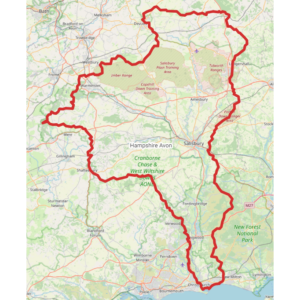
The Hampshire Avon catchment was the starting location for the Environmental Farmers Group. The catchment is the largest chalk stream in England, is GWCT’s home base and already hosted a significant number of Farmer Clusters including the original Farmer Cluster pilot, the Allenford Farmer Cluster led by farmer Rob Shepherd. The conservation plans of the existing Farmer Clusters align directly with those of the EFG.
Some of the activities to date include:
- Working with housing developers on providing nutrient neutrality offset credits.
- Completing a research project on the science behind soil carbon trading.
- Working with EFG sponsors Old Mill on developing a carbon accounting platform.
- Focus on measuring water quality, with a project led by the Wylye Valley Cluster.
Test & Itchen
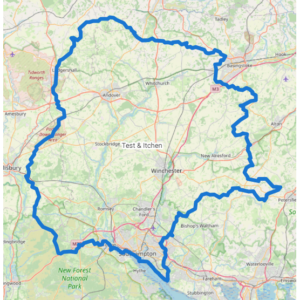
There was a natural growth of EFG into its neighbouring river catchment, due to the fact that Test & Itchen farmers applied to join EFG. This river catchment became EFG’s first new ‘cell’. A Steering Group was formed, chaired by farmer Simon Browne. The farmers have the same three broad environmental objectives and are also focused on protecting the rare chalk streams as well as looking at wildflower meadows which have been in great decline since the First World War.
Other Members of the EFG Test & Itchen Steering Group include:
- Clementine Spalton, farm owner
- James Hewetson-Brown, farmer
- Joe Edwards, farm manager
- Matthew Morton, farmer
- Matthew Norris-Hill, farm advisor
- Nick Rowsell, farmer
- Simon Browne, farmer
Dorset Stour
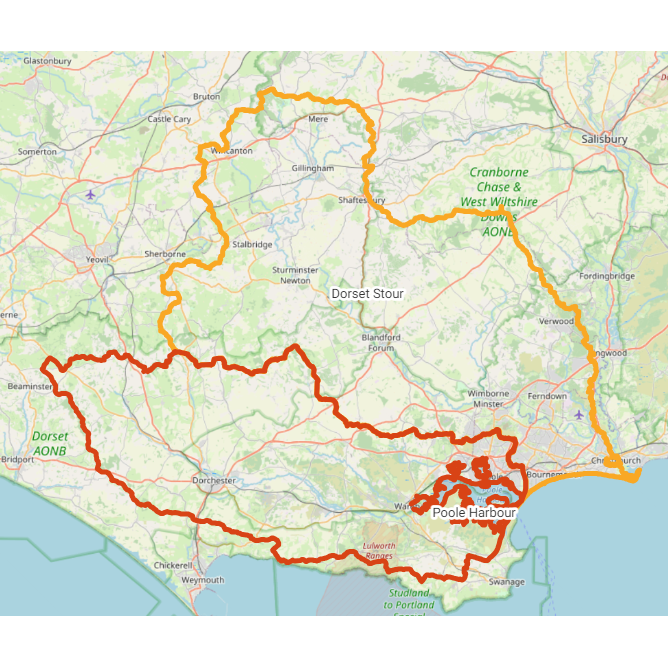
Similarly to the Test & Itchen ‘cell’, EFG has grown into its other neighbouring river catchment, the Dorset Stour. With members growing in the area rapidly, local farmers and cluster facilitators are in the process of building a local steering group for this area.
Northern Lincs
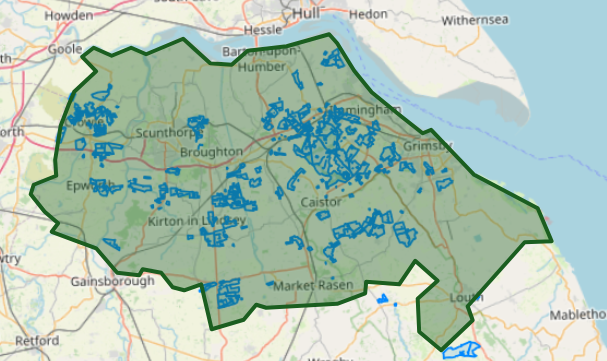
Northern Lincolnshire is EFG’s first non-contiguous area. There was some early demand to replicate the EFG model in the area and so a Steering Group was pulled together to drive the model. This has been sitting regularly since July 2023. With its proximity to the industrial Humber bank, the Steering Group sees some key potential opportunities for EFG farmers to support growth in the area through cleaner water projects as well as biodiversity and carbon mitigation for new industrial developments.
The Northern Lincs Steering Group compromises:
- Andrew Jackson – Farmer, Pink Pig Farm (Chair)
- William Sowerby – Farmer, Forward Farming (Membership lead)
- Anthony Turnbull – Farmer, Turnbull Farms (Sponsorship lead)
- Colin Chappell – Farmer, Gander Farm (Environmental lead)
- Anna Jackson – Farmer, Pink Pig Farm (Marketing & Comms lead)
- James Arden – Farmer, Arden Farms (Trading lead)
- Simon King – Farmer, J. Wharton Agriculture Ltd
- James Dunn – Advisor and Technical Director, ADAS
- Alex Olivant – Agri-environmental consultant, Olivant Rural Services
Central England
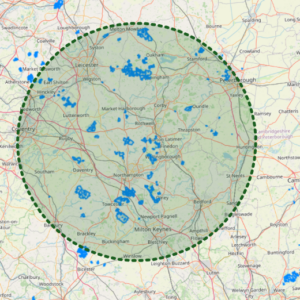
The Central England EFG promises to have the largest geographical spread of all the EFG regions, with the potential to cover 710,000 hectares including catchments in Northamptonshire, Leicestershire, Rutland, Lincolnshire, Cambridgeshire, Bedfordshire, Buckinghamshire and Oxfordshire. Farm types are predominantly arable, but with some mixed farms too.
In terms of charismatic species, the farmers on the Steering Committee are reporting colonies of butterflies like marbled white, brown hairstreaks, purple emperor and wood whites; rare moth species and good moth abundance; many bumblebees which share their habitat with brown hairstreak and wood white butterflies. Many farmers seem to have a good number of grey partridge; some farms have hedgehogs and water voles. Other birds of interest include marsh tit, barn owls and hopefully turtle doves.
Activities and opportunities for investment include:
- Biodiversity offsetting for new homes and industrial warehousing.
- Carbon sequestration for regional industrial emissions.
- Working closely with local Green Investment opportunities.
- Cleaning groundwater and rivers through initiatives with water companies.
- Providing natural flood prevention measures at risk locations.
Members of the Central England EFG Steering Committee include:
- Johnny Wake (Chair)
- Andrew Pitts (farmer)
- Frazer Jolly (farmer)
- Dan Richmond-Watson (farmer)
- Charlie Reynolds (farmer)
- Fred Krefting (farmer)
- Chris Stoate (farmer)
